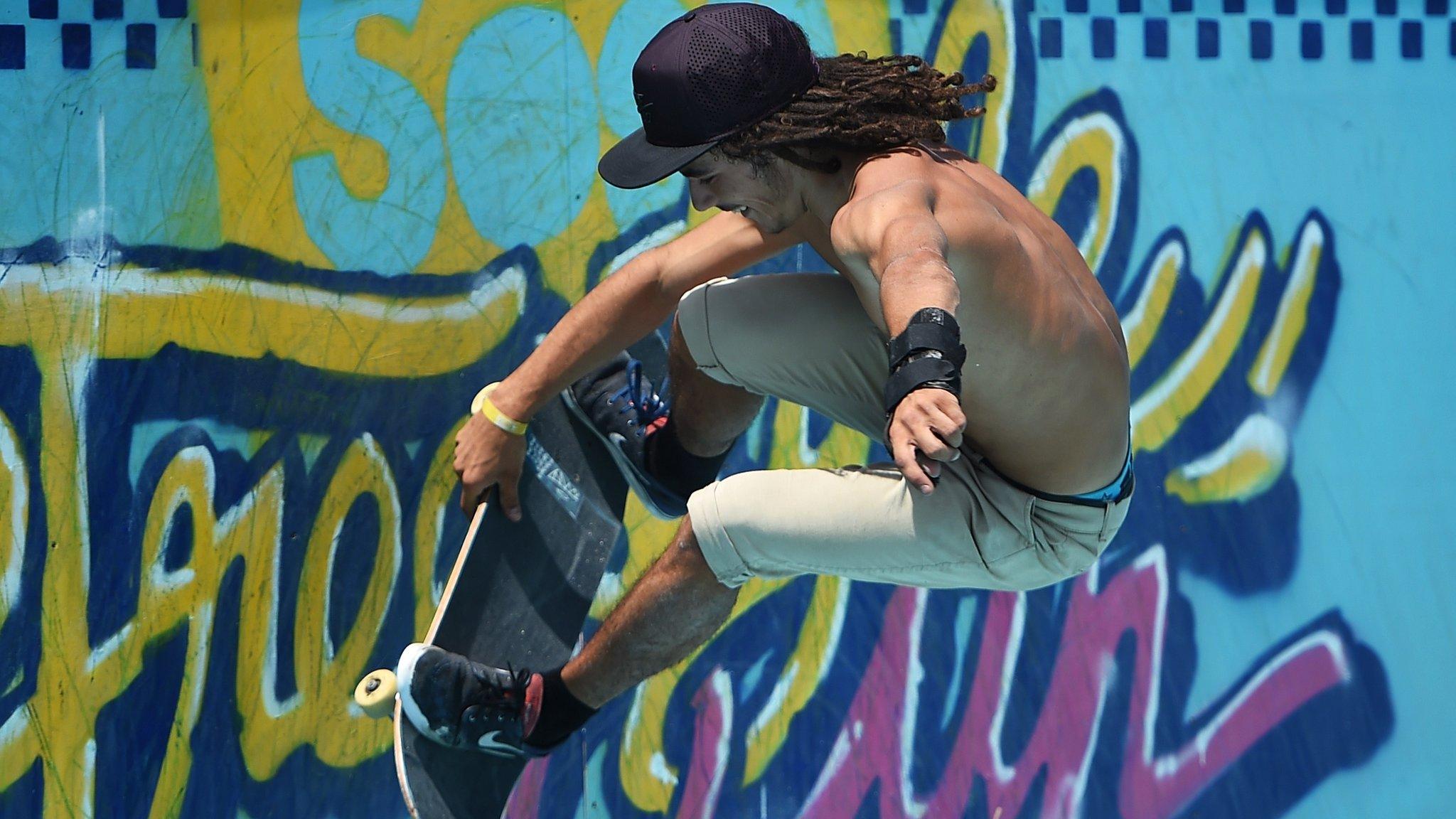Wheelchair tennis: Stephane Houdet wants Paralympic sport to become Olympic event
- Published
- comments
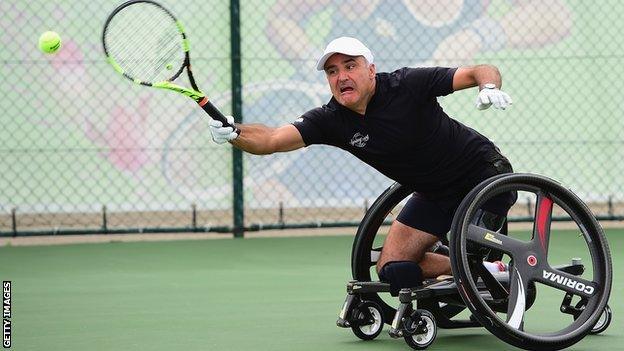
Stephane Houdet hopes to win his 21st Grand Slam title on Saturday in the US Open men's wheelchair doubles
Former world number one Stephane Houdet is pushing for able-bodied athletes to be allowed to compete in wheelchair tennis in the hope it can become an Olympic event.
Houdet has already discussed his proposal with other top male players and disability sports officials.
The 46-year-old wants the sport to be the first to make the transition from the Paralympics to the Olympics.
"It's about inclusion and taking the sport to the next level," he said.
"Wheelchair tennis is among the best wheelchair sports professionally, and right now we are in the locker rooms at the US Open with all the other players.
"What we are is grouped relating to who you are and how you are. Why can't we go further together?"
Rules for both wheelchair tennis and the running game are almost identical. The major difference is that two bounces are allowed in wheelchair tennis before the ball is returned, and only the first bounce has to be in the court.
Twelve-time Grand Slam champion Novak Djokovic tested his abilities in wheelchair tennis, external in Melbourne earlier this year, facing Paralympic champion Dylan Alcott during a charity event before the Australian Open.
'Anyone can sit in a wheelchair and play'
While the change would grow the talent pool exponentially, Houdet - who had his left leg amputated above the knee following a motorbike accident at the age of 24 - said it would open new horizons for disabled athletes.
"We are part of a small group of people who are more or less limited to playing tennis in a wheelchair, so when we win a title, a medal, it relates to the group that we belong to," said the 20-time Grand Slam winner.
"I want to change it so that anyone and everyone can sit in the chair and play. Anyone can do it, so let's integrate as a sport.
"Sport is all about competition. You want to be the best in the world, not be the best of a group and left out from the wider sporting population."
Fernandez throws racquet at ball and still wins the point
Houdet admits not all share his vision, having first called a meeting to talk about the idea with some of the world's top players, including British number one Reid, at July's British Open Wheelchair Tennis Championships in Nottingham.
"Slowly I think some attitudes are changing," he said. "First they thought, 'oh no, able-bodied athletes will be too strong', but now they are thinking they can be part of the wider world and that they can challenge their bodies by playing together.
"It is no advantage to have two legs in wheelchair tennis. The best body type is to have a very strong upper body and almost nothing below the waist."
A snapshot of wheelchair tennis
Wheelchair tennis has been part of the Paralympics as a medal event since 1992, having been introduced as a demonstration sport in Soul four years earlier.
It was the first disability sport to become fully integrated into a world governing body, when it was taken on board by the International Tennis Federation (ITF) in 1998.
It is played at each of the four Grand Slam tournaments, with men's and women's singles and doubles crowns up for grabs at each. Additionally, the US Open and Australian Open include a Quad division - for athletes who have three or more limbs affected - for singles and doubles.
How to play wheelchair tennis in 60 seconds
Like the ATP and WTA, there is an end-of-year Masters tournament, which, after three years at London's Queen Elizabeth Olympic Park, will be hosted at Loughborough University in November.
After the US Open - where Houdet and fellow Frenchman Nicolas Peifer will face British pair Gordon Reid and Alfie Hewett in Saturday's doubles final - the world number four plans to make a proposal to French tennis officials with the hope of lobbying the ITF to make changes.
Ultimately, the three-time Grand Slam singles winner and 17-time doubles champion wants to the see the sport considered as a new event for the 2024 Olympic Games, which are set to be staged in Paris.
How would it work?
Five new sports - baseball/softball, karate, sport climbing, surfing and skateboarding - are all joining the line-up for the 2020 Tokyo Olympic Games, and mixed-gender events in athletics, swimming, table tennis and triathlon have also been approved.
The new additions were all recommended by Tokyo organisers and unanimously backed by the executive board of the International Olympic Committee, while traditionally a sport's international federation would petition the IOC.
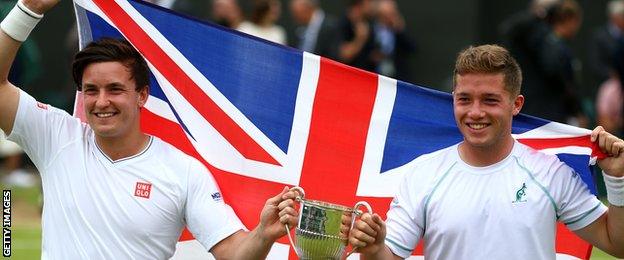
Britain's Gordon Reid (left) and Alfie Hewett won their second successive men's wheelchair doubles title together at Wimbledon in July
Changes proposed by Houdet, in which any disability requirements to play the sport competitively would be scrapped, would mean players such as Andy Murray and Johanna Konta could also compete in wheelchair events.
"We have a professional tour, a mix of genders play, we are part of the ITF and tournaments are televised globally," said Houdet. "OK, the sport is not open to all, so let's change that and apply to the IOC."
'The Paralympics helped me'
Before his accident, Houdet admits he had never heard of the Paralympics. After it, however, the former golfer said he "learned from it", going on to win two gold medals in the doubles.
"What has changed since London 2012 is that people saw what challenges so many of us have come back from," he said.
"People would like their children to have that same psychology and attitude no matter what they have been through. But no-one wants their son to have just one leg, for their daughter to be an amputee.
"If a four-year-old can sit there and want to be a Paralympian by playing wheelchair tennis, maybe one day they can think about an Olympian in that same chair."
Analysis
Nick Hope, BBC's Olympic and Paralympic sports reporter
The concept is fascinating and I can understand how a Paralympic athlete may see inclusion in the Olympics as 'a step forward', with those Games having considerably greater profile and finance.
However, it would go against the spirit, which has driven forward the progression of the Paralympic movement over the past decade.
The International Paralympic Committee (IPC) has a strong relationship with the IOC, but view it as a partnership and does not see itself as a 'lesser player' in the association.
IPC president Sir Philip Craven and his incoming successor Andrew Parsons are against any talk of merging with the Olympics and want to grow their own product rather than acting as a 'feeder' competition.
That said, Baroness Tanni Grey-Thompson told me earlier this week that she would like to see more Paralympic sports join with their Olympic counterparts for major events outside of the Games, such as World and European Championships.
Tennis Grand Slams are actually a good example of how the two can integrate.
However, new Olympic sports generally require either a significantly strong number of elite athletes from around the world already competing in established global events - like Karate - or have an expanding fan-base with youth appeal - like freestyle BMX and skateboarding.
- Published7 September 2017
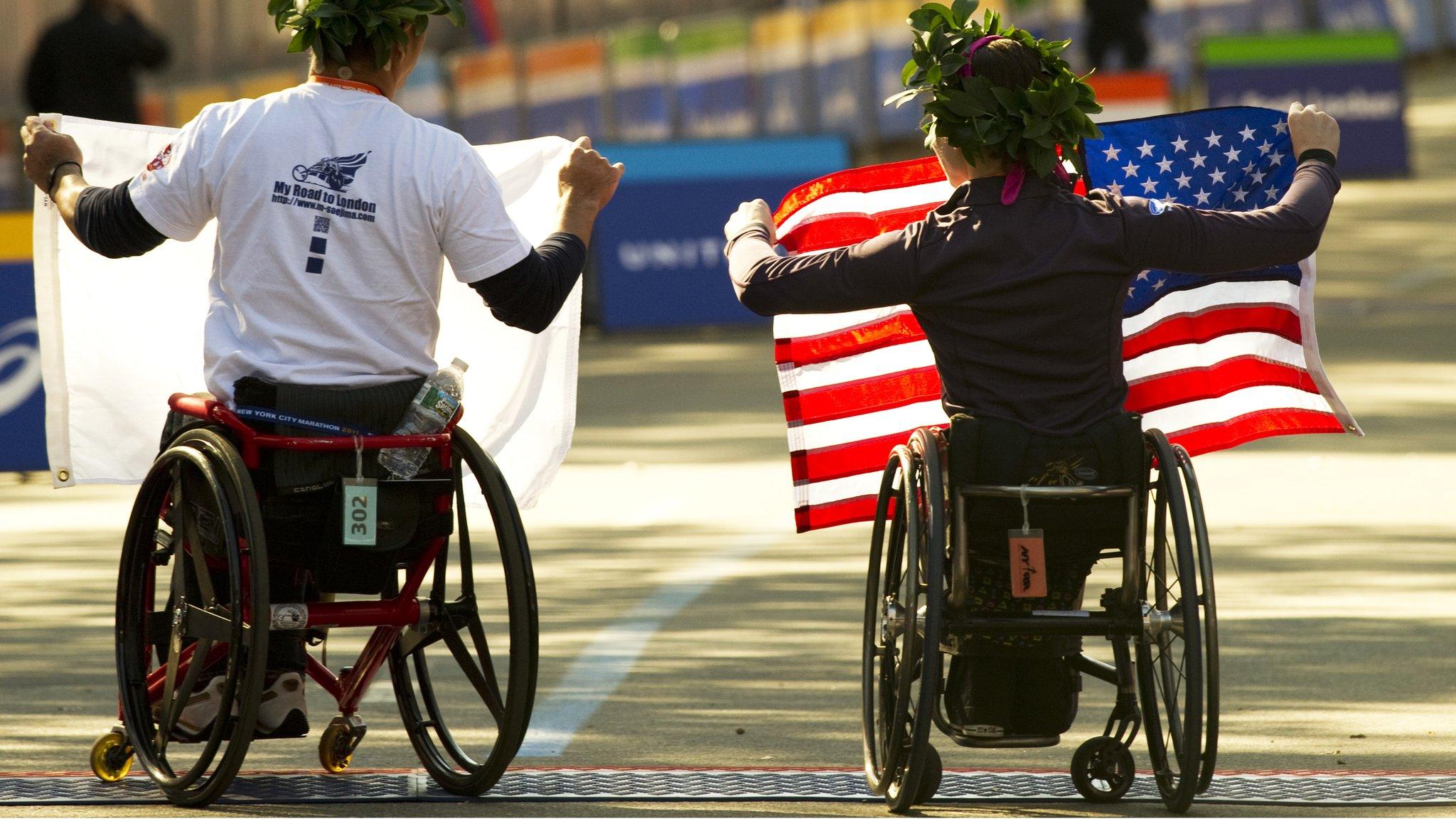
- Attribution
- Published28 March 2017
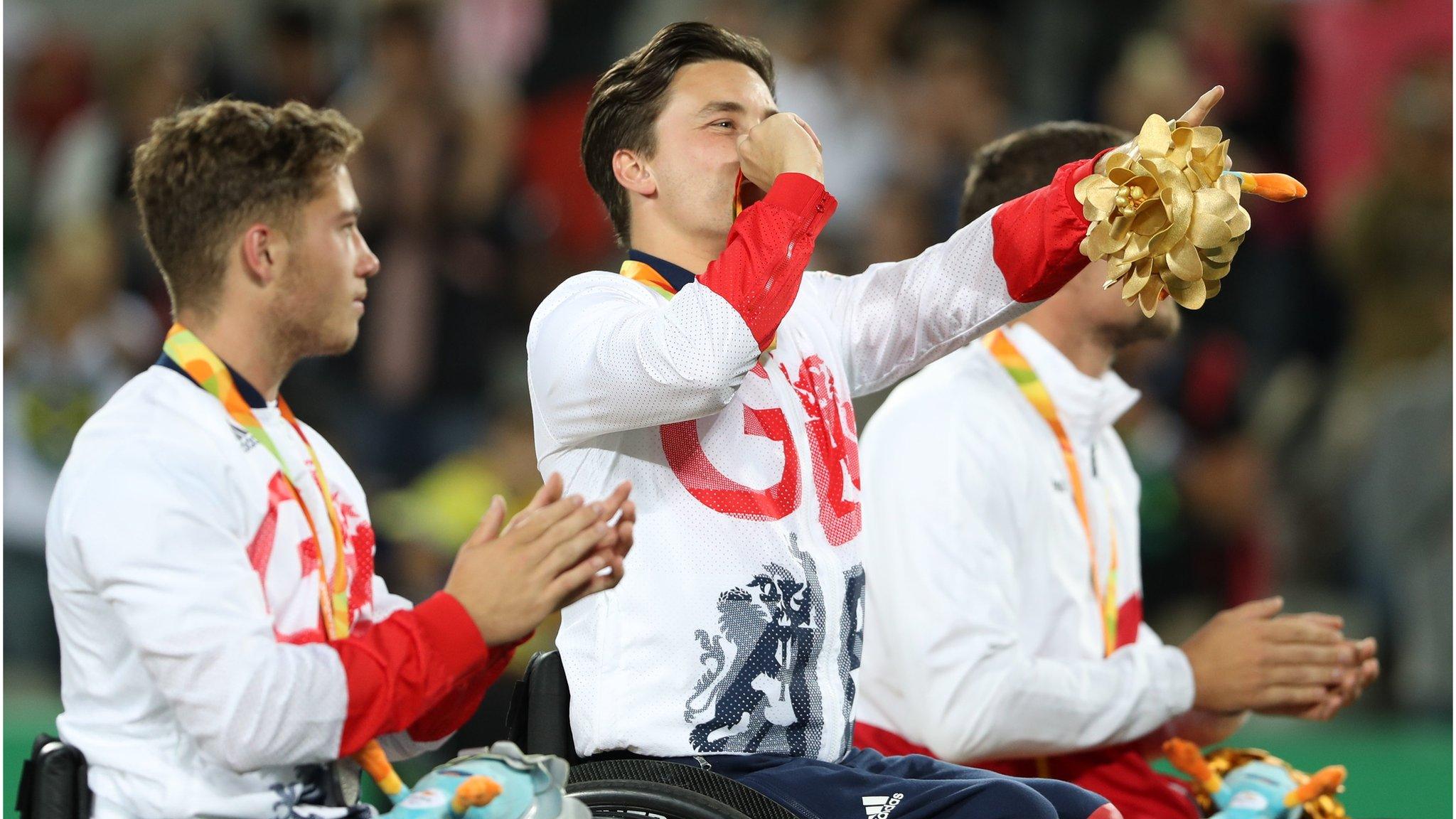
- Published9 June 2017
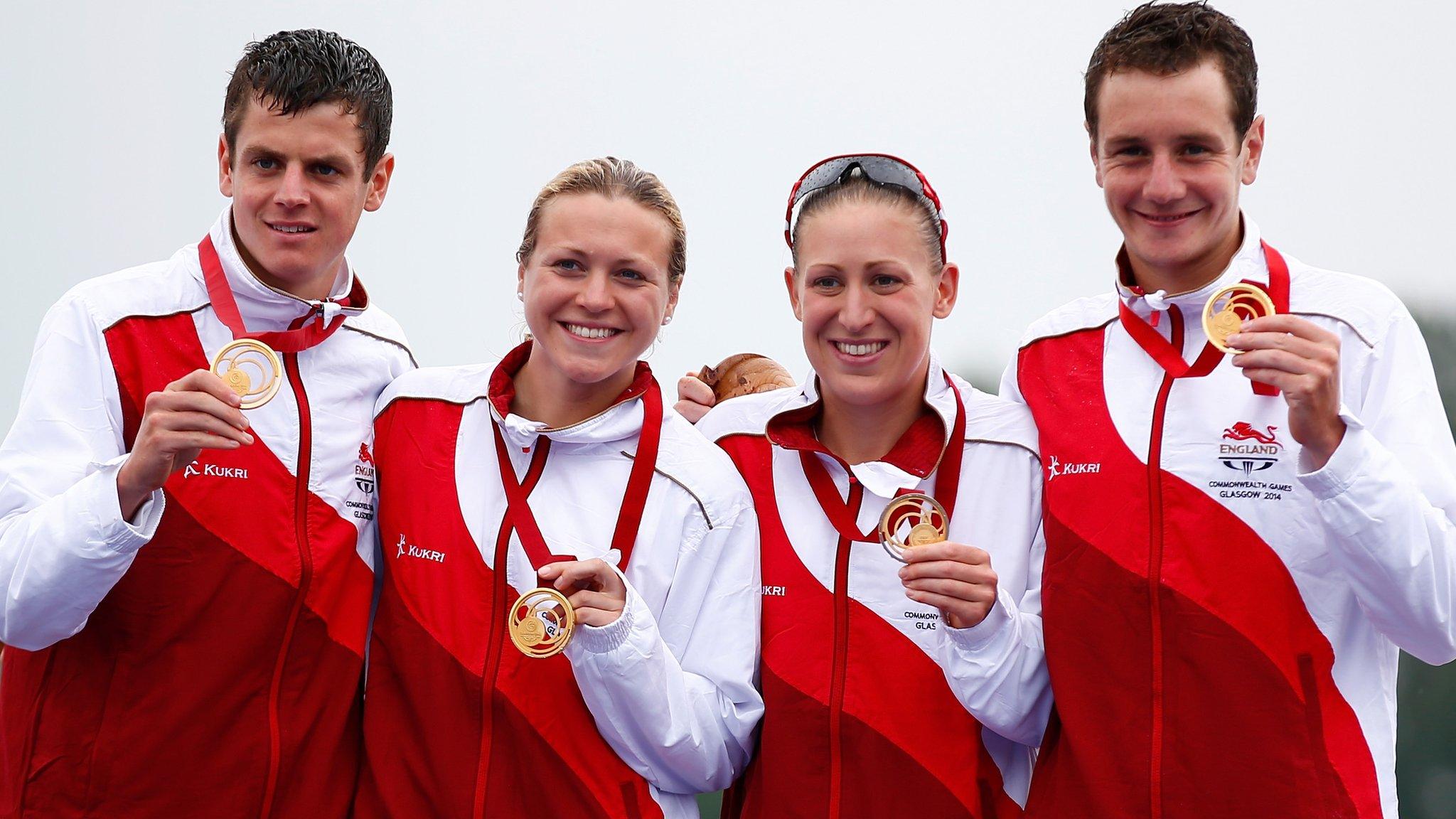
- Published4 August 2016
